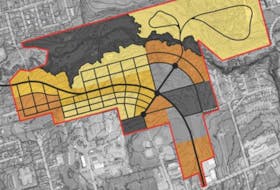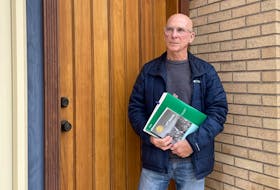A bail hearing got underway Wednesday for William Michael Sandeson, a former Dalhousie University medical student whose conviction for first-degree murder was overturned by the Nova Scotia Court of Appeal last June.
Sandeson, 28, has been in custody since August 2015, when he was charged in the killing of Dal physics student Taylor Samson.
The bail hearing is scheduled for three days in front of Justice James Chipman in Nova Scotia Supreme Court in Halifax.
Sandeson is appearing in court via a video link from the Central Nova Scotia Correctional Facility in Dartmouth. His lawyer, Alison Craig of the Toronto firm Lockyer Campbell Posner, is also participating by video. Crown attorneys Christine Driscoll and Kim McOnie are attending the hearing in person.
The judge imposed a temporary publication ban on the evidence and submissions to preserve Sandeson’s right to a fair retrial. The ban will also cover the reasons for the judge’s decision.
“That decision could come this week or it could come down the road,” Chipman said at the start of the hearing.
On Wednesday, the judge heard testimony from a police officer called by the Crown and from five people being proposed by the defence as sureties.
One more person will testify Thursday in support of Sandeson’s release plan. Counsel will then make their closing arguments.
Sandeson was denied bail by a different Supreme Court judge in October 2015.
Samson, 22, disappeared after allegedly going to Sandeson’s apartment on Henry Street in Halifax on the night of Aug. 15, 2015, to sell him nine kilograms of marijuana for $40,000.
Samson’s body has not been located, but investigators allegedly found his DNA on a handgun, duffel bag and other items seized from Sandeson’s apartment or his family’s farm in Lower Truro.
Sandeson stood trial in Supreme Court in the spring of 2017. His lawyers asked for a mistrial after it was revealed mid-trial that a private investigator retained by the defence had provided information to police, but the judge denied the application.
Two of Sandeson’s neighbours initially told police they hadn’t seen or heard anything on the night of the alleged killing. But the young men, Sandeson’s former track and field teammates at Dal, told private investigator Bruce Webb in the fall of 2016 that they looked into the apartment after hearing a single gunshot and saw a man slumped over the kitchen table, with blood coming from his head.
Webb, a retired RCMP officer, gave the information to police and urged them to re-interview the pair, who had moved to Ontario.
Justice Josh Arnold, in refusing to grant a mistrial, ruled the private investigator’s actions did not breach solicitor-client privilege and caused “insignificant” damage to Sandeson’s right to a fair trial. The defence declined the judge’s offer of an adjournment and did not ask to recall any witnesses.
The jury deliberated for more than 22 hours over three days before finding Sandeson guilty. He was sentenced to life in prison with no parole eligibility for 25 years.
Sandeson’s appeal was heard in the Appeal Court last January. In a unanimous decision, the three-member appellate panel threw out the conviction and ordered a new trial, saying Arnold erred in not declaring a mistrial.
“The late disclosure precluded the defence from being able to fully explore and investigate this unprecedented situation and decide, prior to trial, whether to bring an abuse-of-process application,” Justice David Farrar wrote in the decision.
“While the judge and the Crown suggest the defence could have made an abuse-of-process argument mid-trial, the record shows that forcing them to do so would have been unreasonable and unfair.”
The situation the defence was placed in was “extreme” and demanded a more drastic remedy than an adjournment, Farrar said.
The Appeal Court rejected Arnold’s finding that the police were mere passive recipients of information.
The state conduct in the case “could, arguably, be found to affront society’s sense of fair play and undermine the integrity of the justice system,” Farrar wrote. He said the police could have done any number of things differently.
“There is no reason why the police should not have told Webb he could not disclose aspects of defence trial preparations. The police should have immediately notified the Crown of Webb’s actions so that the Crown could then alert the defence to what Webb had done.
“Instead, Sandeson’s lawyers were left completely in the dark, oblivious to the fact the private investigator they had hired, and with whom they had shared defence strategies, was covertly informing the police, in a relationship the police kept secret.”
Dates for a new trial have yet to be set because the Crown has filed an application in the Supreme Court of Canada seeking leave to appeal the Appeal Court’s decision.
Because the decision to overturn the conviction was unanimous, the Crown did not have an automatic right to appeal it to the top court and must convince it why the case should be heard.
In a brief filed in the Supreme Court of Canada in November, prosecutors said the Appeal Court misapplied binding precedent from the top court.
“The impact on this case and the state of the law going forward is significant,” the Crown wrote.
“No deference was paid to the trial judge’s factual findings or his decision as to the appropriate remedies for late disclosure at trial. The high standard for a mistrial was upended. Leave to appeal is necessary to prevent other courts from being misled by the NSCA’s faulty analysis, which takes the law in the wrong direction on these multiple fronts.”

![['William Sandeson arrives for the start of his preliminary hearing at provincial court in Halifax. Sandeson is charged with first-degree murder in the death of Taylor Samson, a fellow Dalhousie University student, who was last seen on Aug. 15, 2015 and whose body has not been found.']](https://saltwire.imgix.net/william-sandeson-3029670.jpg?cs=srgb&fit=crop&h=568&w=847&dpr=1&auto=format%2Ccompress%2Cenhance)







